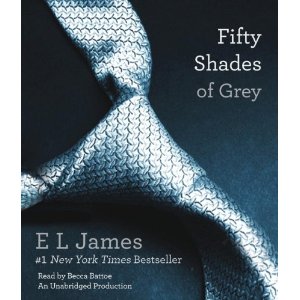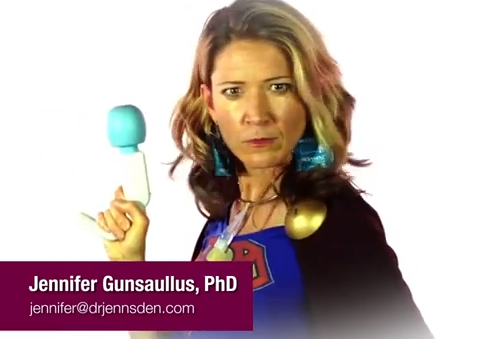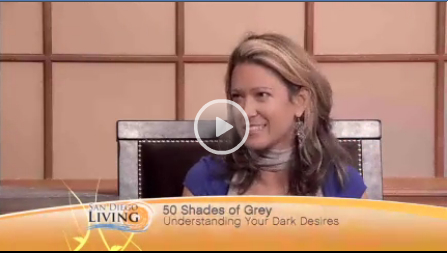 I don’t get it,” my gay friend Sean stated at my video shoot recently. “Why are women aroused by the fantasy of being submissive and how is this new or controversial?” We were discussing the contentious bestseller, Fifty Shades of Grey, by E. L. James. This book, a fan fiction homage to the Twilight Saga, has been labeled “mommy porn” due to its unexpected popularity with married suburban mothers, and its erotic theme of dominance and submission.
I don’t get it,” my gay friend Sean stated at my video shoot recently. “Why are women aroused by the fantasy of being submissive and how is this new or controversial?” We were discussing the contentious bestseller, Fifty Shades of Grey, by E. L. James. This book, a fan fiction homage to the Twilight Saga, has been labeled “mommy porn” due to its unexpected popularity with married suburban mothers, and its erotic theme of dominance and submission.
Sean poses a good question. Why has this book struck a cord with so many American women? While the United States has a thriving BDSM (bondage, dominance, sadism, masochism) community, most of the female readers are not likely already participating in BDSM. In addition, the book is not well written, even by the author’s own admission. Yet somehow it became a word of mouth hit online, long before it was even available in a bookstore. I propose there are several important factors in the success of this book, including beautiful characters, strong personalities, titillating sexuality, taboo dominance and submission, and the romantic evocation of “feeling special.” But before I delve into my analysis of the book’s success, let me offer a brief summary of the plot.
Anastasia Steele, a 21-year old virgin and graduating college senior, meets Christian Grey, an incredibly hot, wealthy, successful 27-year old. They quickly fall for each other, and then she learns of his sexual tastes – to fully dominate the woman he is involved with, both physically and mentally. As well, he has an in-house dungeon where he demands submission. Anastasia waffles between giving in to his whims and fighting his control. Her willful confidence amidst her naiveté is new for Christian, which further arouses him to break his own rules. She feels special, valued, and aroused. However, Anastasia is also disturbed and struggles with his mood swings, controlling sexual tastes, and love of inflicting pain. This novel is just the first of the trilogy, and I have only read one volume so far.
I personally discovered that crappy writing is not as noticeable if the content is turning me on! Despite cringing at the writing style, rolling my eyes at the gender stereotyping, and wincing through some descriptions of pain infliction, I did find much of the content arousing and stimulating. It even made me feel more confident and sexually aggressive. I think I was channeling the attitudes of the characters. This is the power of written fantasy – to embody a new way of being for the reader.
A fantasy of perfection and beauty is pervasive in Fifty Shades of Grey. Anastasia is young, white, innocent, intelligent, slender, attractive, and outspoken yet humble. She’s the quintessential Disney character. Christian is a little bit older than her, wealthy beyond imagination, successful, mysterious, bright, with a hot body and beautiful face. The first time Anastasia has sex, she is easily orgasmic. The first time she performs a blow job, she’s a champ. Christian has never slept in the same bed with a woman or introduced one to his family, yet he quickly breaks all his rules for Anastasia. This all adds up to Anastasia being that “special” girl, who wins Christian’s affection, a la “Pretty Woman.”
And I think that’s a large part of the power of this book. We all want to feel special and desired. Being the object of desire feels good. It’s validating to experience unbridled passion from another; let alone being willing to change your identity due to this passion, and have another willing to change for you. This seems to create an emotional context that grants Anastasia (as well as the female reader) permission to be naughty and explore the boundaries of good girl and bad girl, pleasure and pain, control and surrender. If the reader at home is a powerful, confident woman, Anastasia’s submission means the reader can also experiment with letting go, feel the freedom of surrender, and still be true to her values.
Do I think it is dangerous for our society to have a popular erotic novel with sex tied to violence? Is it sexist, disempowering to women, and rolling back the sexual liberation clock? This is a large part of the controversy, and I’m honestly conflicted in responding. If we lived in a society where sex was open, healthy, and normalized, I could accept the novel as fantasy for fun and stimulation. But we don’t. Sex is much too often mixed with shame, embarrassment, exploitation, misinformation, and abuse. So I think it may be difficult for some to separate pure fantasy from their reality. That being said, I love that we’re talking about women’s arousal and discussing taboo sex. And I enjoyed some arousal of my own. If you have read Fifty Shades of Grey, I would love to hear your opinion about what tickled your fancy or turned your stomach.
(This blog was first posted as part of Pacific San Diego Magazine's Sex & Love Blog.)
~Dr. Jenn Gunsaullus, San Diego, CA -- Sex Therapist, Marriage Counselor, Sexologist, College Sexual Health Speaker













































